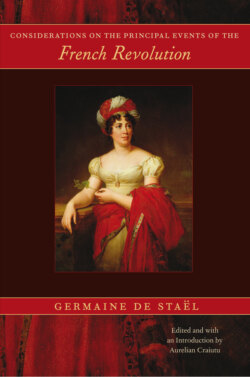Читать книгу Considerations on the Principal Events of the French Revolution - Germaine de Stael - Страница 27
На сайте Литреса книга снята с продажи.
ОглавлениеCHAPTER XV
What Was the Public Feeling of Europe at the Time of Convening the Estates General?
Philosophic views, that is, the appreciation of things from reason, and not from habit, had made so much progress in Europe that the possessors of privileges, whether kings, nobles, or clergy, were the first to confess the unfairness of the advantages they enjoyed. They wished to preserve them, but they laid claim to the honor of being indifferent about them; and the more dexterous among them flattered themselves that they could lull the public opinion so as to prevent its contesting the retention of that which they had the appearance of disdaining.
The Empress Catherine professed to follow Voltaire; Frederic II was almost his rival in literature; Joseph II was the most decided philosopher in his dominions; the King of France had twice taken, in America and in Holland, the part of the subjects against their prince;1 his policy had led him to support the one against their king, the other against their Stadtholder. In England the state of feeling, on all political principles, was quite in harmony with the constitution; and, before the French Revolution, there was certainly a stronger spirit of liberty in England than at present.
M. Necker was then perfectly right when he said, in the act of council of 27th December (1788), that the voice of Europe invited the King to consent to the wishes of the nation. The English constitution, which it then desired, it again calls for at the present day.2 Let us examine, with impartiality, what are the storms which drove her from that haven, in which alone she can find a secure retreat.
